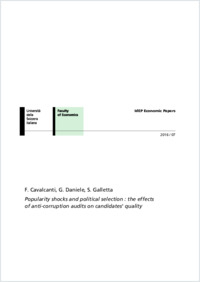Popularity shocks and political selection : the effects of anti-corruption audits on candidates quality
- Cavalcanti, Francisco Barcelona Economic Institute (IEB), University of Barcelona (UB), Spain
- Daniele, Gianmarco Barcelona Economic Institute (IEB), University of Barcelona (UB), Spain
- Galletta, Sergio Istituto di economia politica (IdEP), Facoltà di scienze economiche, Università della Svizzera italiana, Svizzera
-
2016
41 p.
English
We show that the disclosure of information about a government's conduct affects the types of candidates who stand for election. Our empirical test focuses on Brazilian city council elections in 2004 and 2008. The identification strategy exploits the randomness of the timing of the release of audit reports on the (mis)use of federal funds by local governments. We observe that when the audit finds low levels of corruption (i.e., when it represents a positive popularity shock), the parties supporting the incumbent select less-educated candidates. On the contrary, parties pick, on average, more-educated candidates when the audit reveals a high level of corruption (i.e., when it represents a negative popularity shock). These effects are stronger in municipalities that have easier access to local media. Our evidence confirms that parties are strategic players: their decisions are affected by shocks that influence the electoral race.
- Language
-
- English
- Classification
- Politics
- License
-
License undefined
- Open access status
- green
- Identifiers
-
- RERO DOC 277918
- ARK ark:/12658/srd1318815
- Persistent URL
- https://n2t.net/ark:/12658/srd1318815
Statistics
Document views: 180
File downloads:
- Texte intégral: 301
